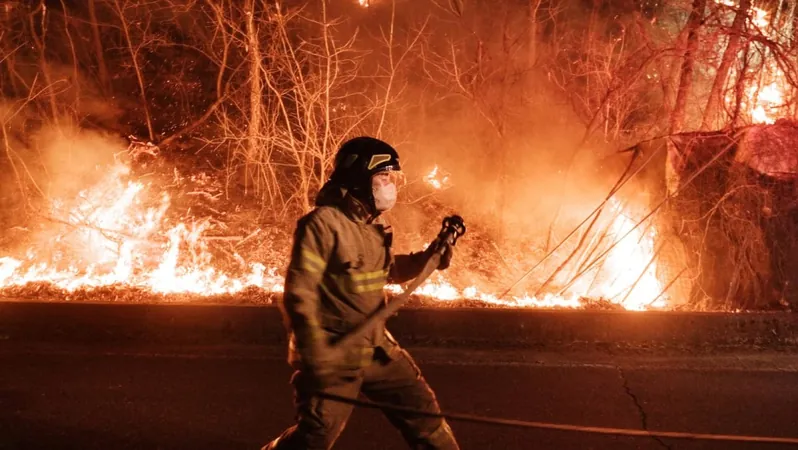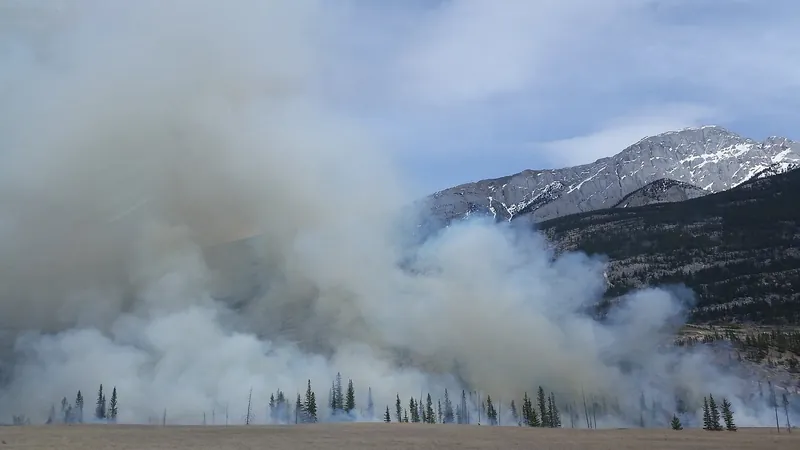
Grave Cleaning Accident Leads to Catastrophic Wildfires in South Korea: Investigation Underway
2025-03-30
Author: Sarah
SEOUL: In a shocking turn of events, South Korean authorities are investigating a 56-year-old man believed to have inadvertently sparked the country's worst wildfires in recorded history while cleaning his relatives' gravesites. The incident unfolded on March 22 in Uiseong, North Gyeongsang province, where a series of devastating fires have claimed 30 lives and scorched more than 48,000 hectares of forest land.
The man, who has not been publicly named, was tending to his grandparents' graves when he reportedly attempted to burn tree branches using a cigarette lighter. According to his daughter, this seemingly benign act triggered a chain reaction, leading to a fire that was rapidly fanned by high winds and dry conditions, causing a catastrophe that officials are still grappling with.
"Once the flames ignited, they were carried by the wind, quickly escalating into a massive wildfire," she detailed during her statement to investigators, as reported by Yonhap news agency. Now, the police have booked the man for investigation purposes, with plans to question him once the ongoing site inspections are finalized—an endeavor that could extend for over a month.
Authorities have highlighted that South Korea has been experiencing severe drought and exceptionally high temperatures following its hottest year on record in 2024, contributing to the extreme fire conditions. The situation is aggravated by consistent below-average rainfall over the past months, turning the landscape into a tinderbox.
Tragically, the inferno's death toll includes a helicopter pilot who met with a fatal accident while trying to manage the blaze from the air. Additionally, the wildfires have wreaked havoc on several cultural heritage sites, notably the historic Gounsa temple complex in Uiseong, established in the 7th century.
The disasters have also exposed the underlying demographic crisis in South Korea. Many of the affected areas are rural, with a declining population and an increasing elderly demographic, highlighting significant regional disparities that have persisted over the years. As firefighters work tirelessly to bring the flames under control, the nation faces not only the loss of life and property but also a pressing need to address the vulnerabilities within its communities.
As South Korea navigates this unprecedented crisis, questions linger regarding fire safety protocols and how to prevent future disasters of this scale. The nation grapples with the impact of climate change, making it clear that proactive measures must be taken to protect its citizens and heritage from the ever-growing threat of wildfires.


 Brasil (PT)
Brasil (PT)
 Canada (EN)
Canada (EN)
 Chile (ES)
Chile (ES)
 Česko (CS)
Česko (CS)
 대한민국 (KO)
대한민국 (KO)
 España (ES)
España (ES)
 France (FR)
France (FR)
 Hong Kong (EN)
Hong Kong (EN)
 Italia (IT)
Italia (IT)
 日本 (JA)
日本 (JA)
 Magyarország (HU)
Magyarország (HU)
 Norge (NO)
Norge (NO)
 Polska (PL)
Polska (PL)
 Schweiz (DE)
Schweiz (DE)
 Singapore (EN)
Singapore (EN)
 Sverige (SV)
Sverige (SV)
 Suomi (FI)
Suomi (FI)
 Türkiye (TR)
Türkiye (TR)
 الإمارات العربية المتحدة (AR)
الإمارات العربية المتحدة (AR)